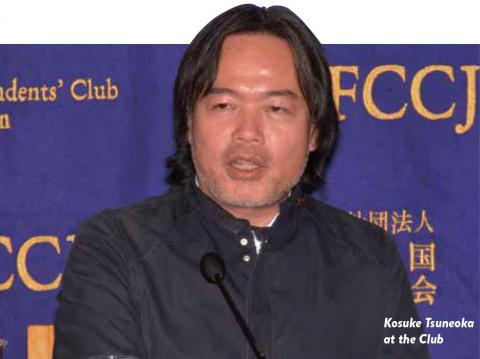Issue:
For a Japanese journalist, an Islamic State logo leads to misunderstanding and incarceration in the dangerous region outside Mosul.
Behind bars in Iraq
JULIAN RYALL

FROM THE VERY OUTSET of his press conference at the FCCJ in November, Kosuke Tsuneoka went to great lengths to make it clear that he is not an Islamic State sympathizer and that he deplores the extremist group’s interpretation of Islam.
Tsuneoka who had only arrived back in Japan two days previously after being detained for 12 days by Kurdish forces close to the Iraq city of Mosul was keen to set the record straight after a “stupid” error of judgment was compounded by some inaccurate reporting by local journalists that was repeated by international media. And, given that he intends to return to the war torn region to continue to file reports for Japanese media, the 47 year old Tsuneoka said it is important that his name is cleared.
“I was shocked at some of the reporting by the local Kurdish media that was then repeated in English and other media,” Tsuneoka said. “The reports claimed that I had been working as an interpreter for Islamic State and that I had been awarded a medal for my work with them.
“This is completely false information,” he said. “And if it continues to be reported and then becomes accepted as accurate, then that would be extremely unfortunate.”
Tsuneoka’s story is, nevertheless, a remarkable one. He has visited areas of Syria and Iraq controlled by Islamic State on three occasions, building sufficient rapport with some of the organization’s leaders to be invited to visit the caliphate’s self declared capital of Raqqa in Syria in September 2015. At the end of that reporting trip, aboard a bus heading towards the Turkish frontier, he fell into conversation with a Russian IS fighter. At the end of the journey, the Russian gave him a key holder bearing the logo of Islamic State.
Tsuneoka thought nothing of the gift and said he was interested in following up on a future visit to see if IS was manufacturing tourist trinkets and if it might make an interesting story. He kept the key holder on his latest visit to the region and, unthinkingly, had it in a pocket of his backpack when he tried to enter a press conference given by Iraqi President Fuad Masum, outside Mosul.
The unmistakable logo triggered an immediate reaction from the security officials surrounding the venue and Tsuneoka was handcuffed and taken into custody for interrogation by Kurdish intelligence officials. “Obviously, I was suspected of being an IS member who was trying to sneak into the news conference,” he said, adding that he had been “completely idiotic.”
THAT IDIOCY WAS MADE worse when local media reported that the key ring was, in fact, a medal that Tsuneoka had been awarded by Islamic State for acting as an interpreter on a previous visit. He vigorously denies that claim, although he confirms that he did visit IS held areas with a Japanese academic who had been asked to attend a hearing of an IS court and to interpret proceedings.
The Kurdish authorities were not taking any chances with Tsuneoka and transferred him to Erbil, where he was questioned for two days by security officials. “I didn’t feel the need to hide any information or refuse to answer their questions, particularly those about my history of reporting from the area,” he said. “For the first hour or so, it was very tense, but after that the atmosphere changed and became almost genial to the point where we were laughing together.”
His interrogators were particularly amused by an exchange of messages between Tsuneoka and a Chechen commander fighting for Islamic State that he had met on a previous trip. With neither of the men speaking much of each other’s language, they had been forced to communicate in basic English. That led to a bizarre exchange in which the Chechen fundamentalist had messaged “I love you” to Tsuneoka, to which he had replied, “Me too.”
Given that he was getting on so well with his captors they had told him that they did not consider him to be a “dangerous individual” Tsuneoka said he assumed that he would be released very soon. The Kurdish intelligence officers said they just wanted to check the contents of his mobile phone.
Instead, it was a week before the door to his room was unlocked and an official of the Japanese embassy in Baghdad was ushered in. Tsuneoka was informed that he was not completely in the clear and that the Kurdish officials were taking a hard line on his activities. It was an anxious further five days before the official was able to secure Tsuneoka’s release, on condition that he return to Japan on temporary travel documents and that his passport would be posted to him 17 days later.
Kurdish officials did confirm that he would be permitted to return in the future if their investigation cleared him. Tsuneoka is unequivocal on that score. “I want to make it clear that I am not and never have been a member of IS and that I am not a supporter of IS,” he said. “I am a Muslim . . . but my Islam is not their faith.”

